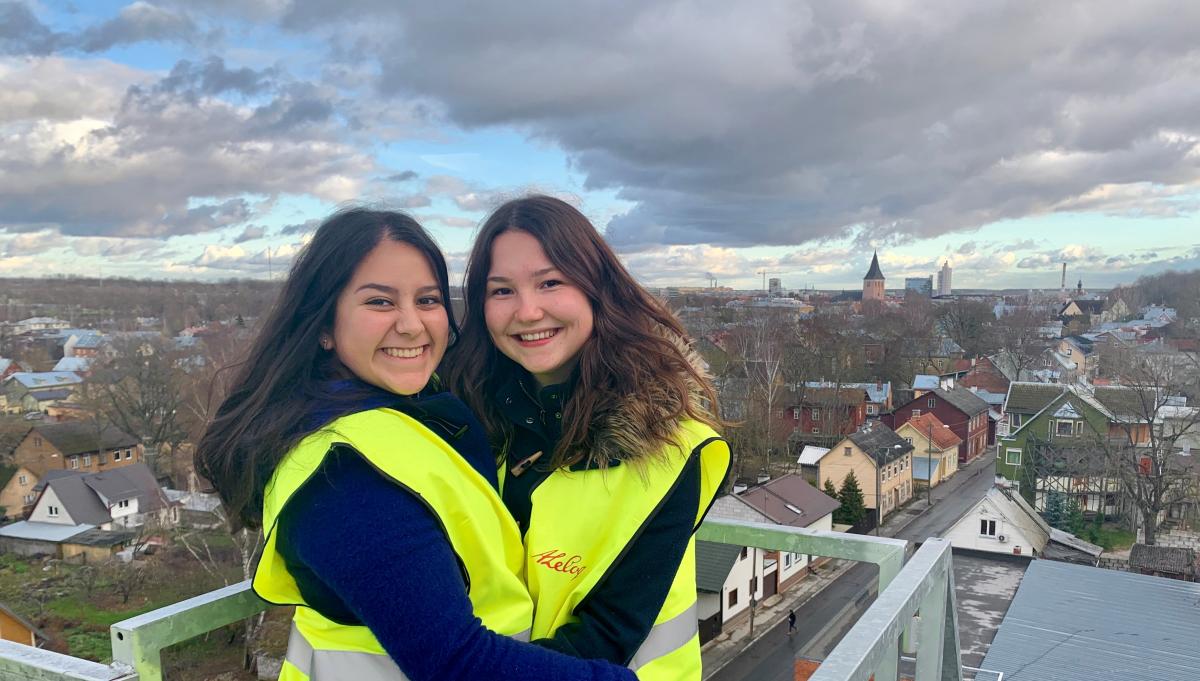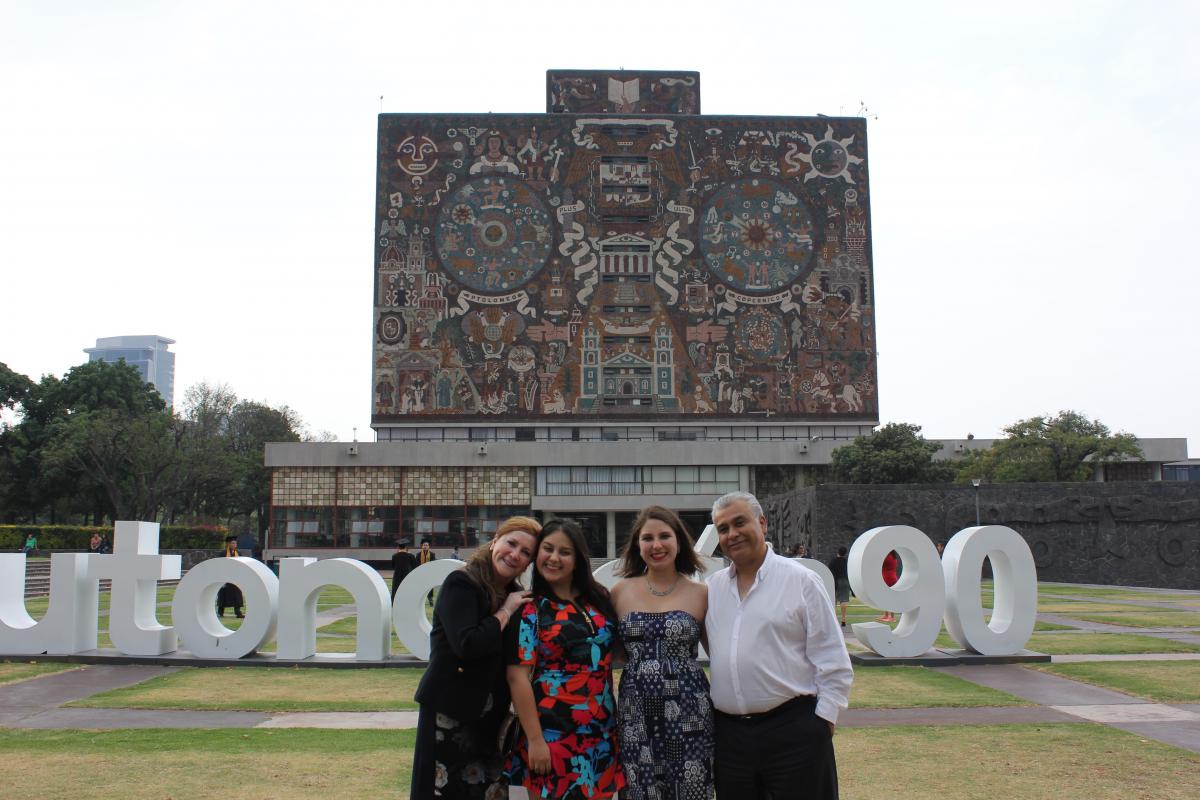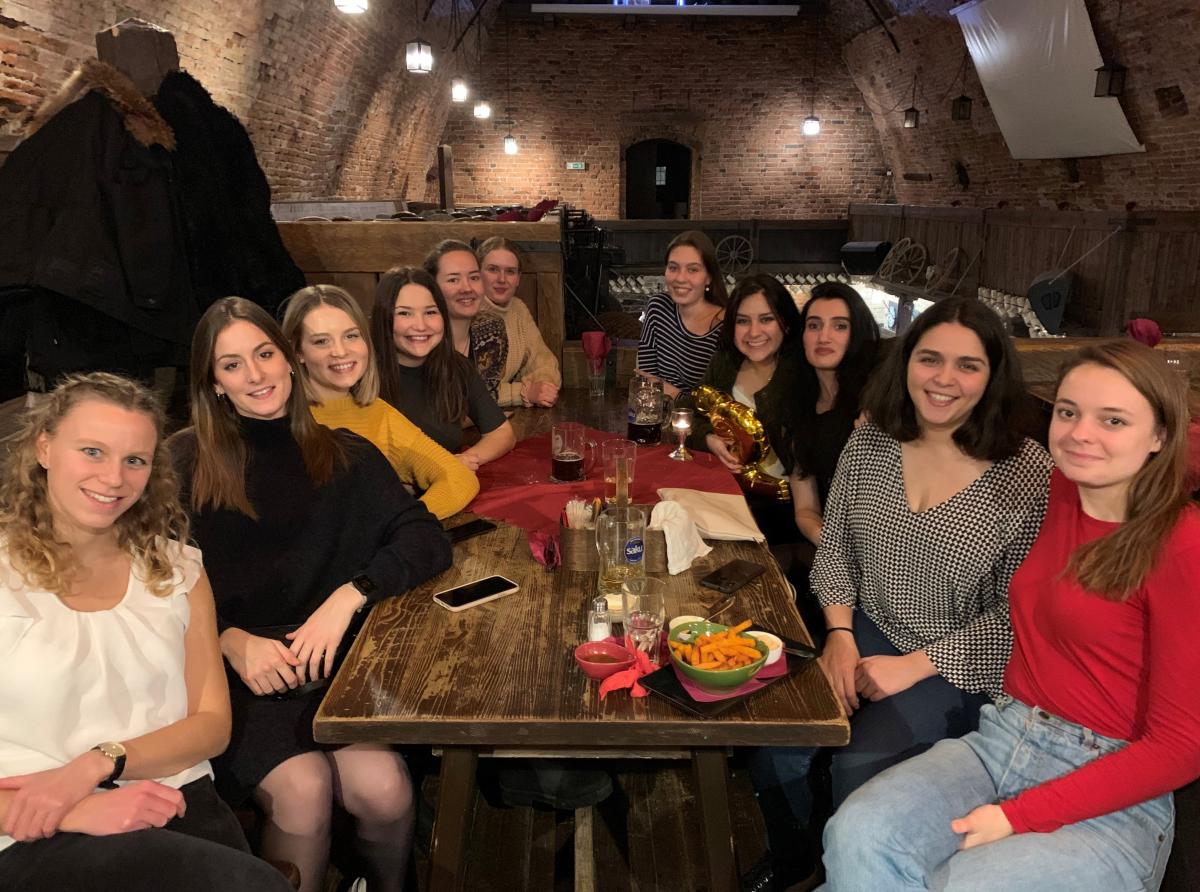
Renata (on the left) with her best friend Anna from Austria on top of the A. Le Coq Tower in Tartu.
Renata Villalobos Anaya, 22, from the capital of Mexico, came to Estonia to study for one year. Spending her exchange year in the Estonian University of Life Sciences, she wishes to gain knowledge in landscape architecture. In the future, she hopes to contribute to solving societal challenges via architecture.
Her home city of more than 21 million inhabitants is where her beloved "family of lawyers" lives. Mother Luz Maria and father Roberto work as attorneys, while her elder sister Luz del Mari is still a law student. Renata, the youngest in the family, has not felt pressure to study law, though. „For my parents it is important that I do what makes me happy,“ Renata says gratefully and adds that her exchange year had her parents’ support from the very beginning.
Love at first sight
Perhaps the biggest concern about coming to Estonia was the climate difference. „I had heard it is incredibly cold here. In fact, it is not so bad at all,“ she admits, noting that the climate and environment, while being different from what she is used to, are nevertheless changes she really appreciates. Although Renata says she tends to be afraid of changes, she is still seeking them: „Changes help me grow!“
The determined decision to come to Estonia partly goes back a couple of years, when their family of four took a trip across the Atlantic Ocean. In the summer of 2016, the family visited Denmark, Norway, Sweden, Finland, Estonia and even Russia. „I fell in love with your country already then. I really appreciate how small and beautiful Estonia is, the abundance of greenery and the opportunity to experience silence,“ Renata admits. For example, parks with lots of trees are a luxury in her home country. According to Renata, there they are mainly for the rich and privileged to experience.
Home and away
At home, Renata studies architecture at the National Autonomous University of Mexico, Universidad Nacional Autónoma de México (UNAM), which is one of the biggest in Latin America. For instance, at the end of the 2018/2019 academic year, there were 356 530 students, versus 2139 students in the Estonian University of Life Sciences at the same time – a difference of more than 166 times.

Renata's family in front of the Central Library of National Autonomous University of Mexico in Mexico City.
From left: Mother Luz Maria, Renata herself, sister Luz del Mari and father Roberto.
In Mexico, the BA studies for architecture take five years. Renata has completed four, which means that after her year in Estonia she has to go back to Mexico, write the final thesis and graduate from the university.
She had the desire to go abroad for a university exchange year even before she had actually become a student. When the time came to apply for the exchange programme, she had the choice of Portugal, Romania and Estonia. Already during the application process, she was secretly wishing for the opportunity to come to Estonia and to the University of Life Sciences, specifically.
Valuing sustainability
Even though her actual specialty is architecture, Renata finds it important to supplement her education in the field of landscape architecture as well. Architecture studies often focus on a single object or construction, Renata explains, instead of the wider picture, with the scenery or surroundings.
In the future, Renata wishes to design rooms that help people feel well and included. „The sustainability aspect, practised in the university, is extremely important to me. I want to focus on sustainable solutions that consider peoples’ needs in my career,“ she says and adds that her desire is to design constructions characterised by energy efficiency and meaningfulness in the surrounding environment as well.
She has taken courses on sustainability in Mexico also, but that is not exactly the primary focus in her home university. Therefore, Renata believes that her studies of landscape architecture in the Estonian University of Life Sciences will open a wider panorama of the issue, which helps her to better prepare for the future.
Renata finds there is much in her home country she would like to contribute to. In the Estonian University of Life Sciences, the aim of her current studies is to help her country in the future. She believes there are various methods for solving societal problems and everybody can choose their own way to change the world.
International chemistry
Living on the 10th floor of the Torn dormitory, Renata spends a lot of time with her schoolmates. In her free time, dinners with friends that feature gossip, laughter and playing UNO are often organised. Food is something that brings the bunch together. When alone, she may often be seen drawing animals, which is one of her favourite activities.
Renata is very happy and thankful for the friends she has found in Estonia. „We do many things together, even go abroad. We always have the best time together,“ she says joyfully, and explains that besides the locals, her friends in Estonia are also from, for instance, Austria, France, Portugal, Germany, Finland and Iran.

Renata with friends on her 22nd birthday in Tartu, Estonia.
From left: Leonie Döhring (Germany), Alix Dayonnet (France), Julia Steringer (Austria), Anna Steinhuber (Austria), Ronja Erichsmeier (Germany), Sofia Kaiser (Finland), Ilona Hiidenmies (Finland), Renata Villalobos (Mexico), Mana Taheri (Iran), Maria da Nazaré Rebelo (Portugal) and Katharina Mägi (Germany).
One grain of wisdom she got from her experience here is discovering that people of various origins are not that different actually. „It’s true that our educational background, outlook on life and experiences can be different. But, based on my friends from all over the world, I can say that actually we are quite the same.“ Renata also admits that the good chemistry with her friends might have come from finding and focusing on things they have in common with companions.
Valuable academic atmosphere
In Renata’s opinion, the strengths of the Estonian University of Life Sciences are the personal approach and fast administration. In her mind, personal attention in studies is valuable. “It is important for a person to feel that they have a voice and they have been noticed,“ she explains. While the students in a larger university oftentimes remain anonymous to their lecturers, the University of Life Sciences offers a personal approach.
Administrative issues also take much less time than in big universities. For instance, when Renata needed an official document to be sent to her home university, she got it from our university's academic department in a couple of days. At home, these things would surely take a lot more time, the student assures.
Renata finds that Estonian University of Life Sciences is a positive example to many other universities. „You actually really are focused on sustainability principles and think it’s relevant in your topics. In my mind all universities in the world should promote sustainability,“ she says.

Renata in Saariselkä village in Lapland befriending a Finnish dog.
Fears ungrounded
Reflecting on her experience of the exchange year so far, Renata says everything has worked out smoothly and even better than she had expected. Admitting herself to be an emotional and passionate person, she was concerned about one specific issue: she loves to hug people. „I was afraid of what would happen if I couldn’t hug anyone here,“ Renata admits with a laugh. The Mexican exchange student confirms that, contrary to her initial fear, she is getting her daily amount of hugs without a problem.
Renata feels that Estonians have been very kind to her. Even though she is away from home, she feels welcome here. „I like Estonia and Estonians very much. I think Estonians also need to realise how good their country is. Estonian people and all the incredible friends I’ve made here make me feel less far away from home.“
Text: Andri Küüts
